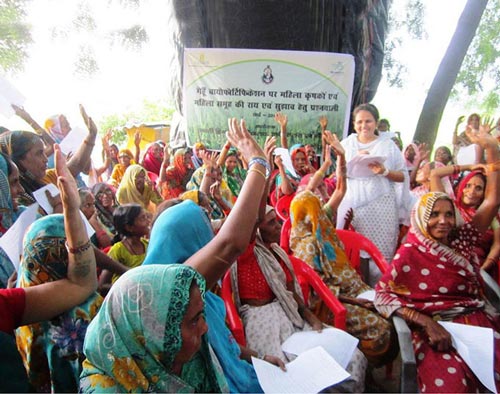By Arun Joshi/CIMMYT

Women farmers in India are learning about the benefits of biofortified wheat from CIMMYT and other CGIAR researchers. Scientists met with 106 women on 8 August in the village of Pidkhir, in Mirzapur District of Uttar Pradesh, India, to advocate for the use of biofortified wheat and listen to feedback on nutrition and the impacts of nutritional deficiency on women and children.
The event was part of a program conducted in more than 50 villages in India’s Eastern Gangetic Plains. Collaborators included Banaras Hindu University (BHU) in Varanasi, Mahamana Krishak Samiti (a farmers’ cooperative in Mirzapur) and CIMMYT’s South Asia office in Kathmandu, Nepal. BHU’s Chhavi Tiwari led the meeting in Pidkhir, which was attended by women of different ages and occupations including farmers, housewives, daily wage workers, government organization workers and school teachers. Other participating scientists included B. Arun, Ramesh Chand and V.K. Mishra from the BHU HarvestPlus wheat team as well as Arun Joshi from CIMMYT.
The HarvestPlus project was started at BHU in 2005 as part of a collaborative effort with the Biofortification Challenge Program (HarvestPlus) at the International Center for Tropical Agriculture, the International Food Policy Research Institute and CIMMYT to identify biofortified wheat varieties adapted in South Asia. Five of the participants at the meeting participated in the HarvestPlus trials in Pidkhir that began in 2005 and said they were happy with the wheat variety. “I cannot believe that wheat with high zinc and iron could be grown in our fields in the near future,” said Sursati, a woman working with HarvestPlus wheat throughout the course of the project. Most participants were new to the subject and learned about the importance of biofortified wheat – particularly its importance to the health of women and children. Women also answered a questionnaire on their backgrounds and interests in biofortified wheat. Most were educated through primary school and some were given help by literate peers. Four male farmers from Pidkhir, including Harbans Singh, head of the Mahamana Krishak Cooperative, also facilitated the process.
All of the women were in favor of receiving biofortified wheat developed through the HarvestPlus project. They also expressed their desire to visit and see the BHU research farm, where wheat scientists from the university are conducting research with CIMMYT’s Global Wheat Program team. The farmers agreed to advocate for new biofortified wheat varieties and help the BHU team when needed.
 Capacity development
Capacity development 
